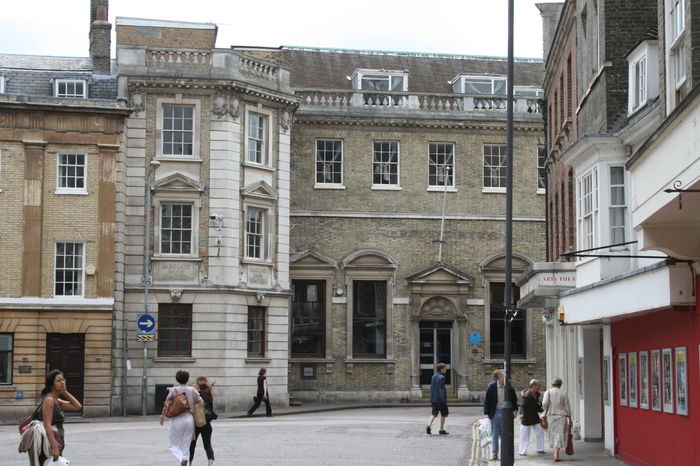Settlement House founded by Pembroke students responds to Covid-19 food crisis
The South London charity has distributed 40 tonnes of food since national lockdown began

Pembroke House, a charity founded by Pembroke students in 1885, has been transformed into a food hub for the local community during the pandemic.
The settlement house, which is based in Walworth, South London, was established with the goal to create community solidarities in an area characterised by socio-economic inequalities. Recently, after shutting its doors because of the lockdown, Pembroke House recruited over a hundred volunteers to distribute food within a 2.5km radius.
Mike Wilson, executive director of Pembroke House, told Varsity that Pembroke House decided to transform their building into an Emergency Food Distribution Hub after “reaching out to people” and discovering “food insecurity was the dominant worry”.
Pembroke House was initially set up as a part of the settlement movement, a series of social welfare initiatives which aimed to reduce inequalities by providing shared community spaces in areas of high socioeconomic inequalities making rich and poor cohabitate in a shared community space. The term ‘settlement’ refers to the way in which residents ‘settled’ in the poor neighbourhoods in which they worked, living alongside local residents as neighbours.
Pembroke House has distributed six tonnes of food a week, as well as moving many of their normal activities online, such as music and dance classes.

Wilson, himself a Pembroke College alumni, explained that the Covid-19 pandemic had not begun a food crisis as much as it has revealed the pre-existing issues which many people have with regards to food access. He suggests that the way in which lockdown has restricted “our ability to get out of the house” has pushed a “huge number of people into crisis”.
As many as one million Britons have lost all sources of income as a result of the lockdown which has contributed to the unprecdented rise in use of food banks.
Wilson says Pembroke House’s food distribution addresses the symptoms of the food crisis but not the “root causes” and believes that the next steps will be challenging. He expects Pembroke House’s capacity to provide support to decline at the same time as need increases, as volunteers go back to work and government emergency schemes come to an end.
Settlement houses have inspired key founders of the welfare state: politicians Clement Attlee and William Beveridge both spent some time living at Toynbee Hall, a settlement house in London’s East End. Settlement houses, which reached their peak in number in European cities during the 1920s, have since declined in number.
The University of Cambridge was heavily involved in the development of the settlement movement, and settlement houses founded by members of Newnham and Girton College, as well as Trinity College, continue to function today.
Pembroke House follows the initial model of a shared residency: the charity owns a residency next door to the community centre where volunteers live together.
Wilson stated the settlement model was never “a traditional charity model about simply raising people out of poverty” but rather a model about inventing new forms of cohabitation within neighbourhoods comprising people from different socioeconomic backgrounds, who often live alongside each other without mixing.
He said the situation in Walworth was much like “a tale of two London’s” with some of the UK’s most deprived estates neighbouring some of its wealthiest.
Pembroke House hopes to keep strong ties with the 140 volunteers who offered to distribute food across the borough during the pandemic, and to involve them in longer-term projects.
Pembroke College continues to have an active role in Pembroke House, with around half of the board of trustees composed of Pembroke alumnus and the current College Master, Lord Chris Smith, serves as the Charity’s Chair. Pembroke House also offers short internships to Pembroke students and hopes to involve Cambridge students with Walworth youth through a new mentoring project.
James Jenkins, a Cambridge graduate who is responsible for the charity’s music academy, says after a period of where engagement was down there has been “a swell of interest from Pembroke students in the charity, especially after the internship scheme started”.
 Comment / Cambridge students are too opinionated 21 April 2025
Comment / Cambridge students are too opinionated 21 April 2025 Interviews / Meet the Chaplain who’s working to make Cambridge a university of sanctuary for refugees20 April 2025
Interviews / Meet the Chaplain who’s working to make Cambridge a university of sanctuary for refugees20 April 2025 News / News in brief: campaigning and drinking20 April 2025
News / News in brief: campaigning and drinking20 April 2025 Comment / Cambridge’s tourism risks commodifying students18 April 2025
Comment / Cambridge’s tourism risks commodifying students18 April 2025 Comment / Cambridge’s gossip culture is a double-edged sword7 April 2025
Comment / Cambridge’s gossip culture is a double-edged sword7 April 2025






